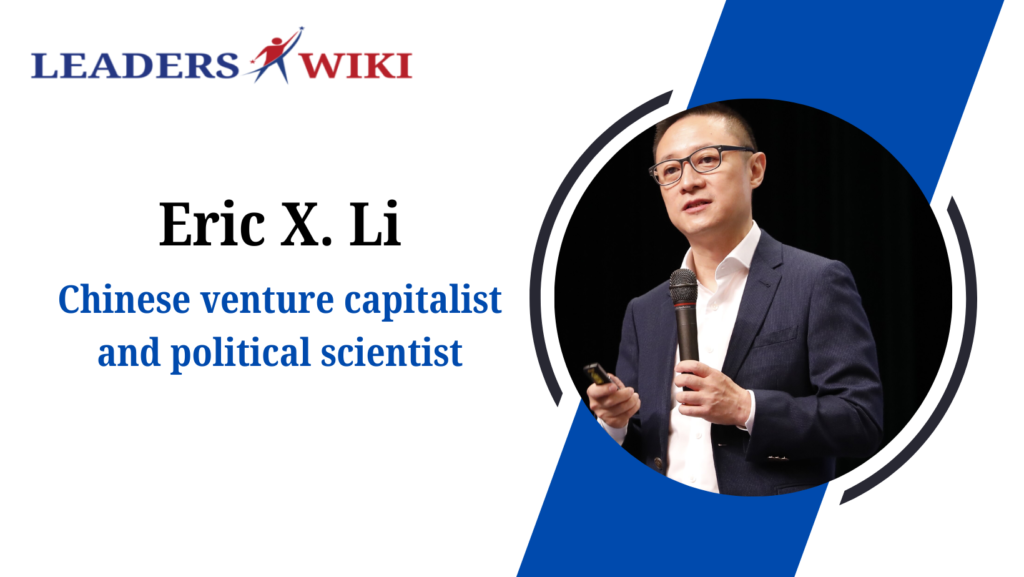Eric Xun Li, born Li Shimo (Chinese: 李世默; born May 4, 1968), is a renowned Chinese venture capitalist, political scientist, and commentator known for his extensive contributions to both the business world and political discourse. He is the founder of the influential Chinese nationalist news site Guancha.cn (Chinese: 观察者网) and serves on several prestigious boards, reflecting his significant influence in academia and cultural institutions.

Early Life and Education
Eric Xun Li was born in Shanghai during a transformative period in Chinese history. Raised in a rapidly modernizing China, he was part of a generation that witnessed significant socio-economic changes. Seeking broader educational opportunities, Li moved to the United States in the late 1980s. He pursued a BA in Economics at the University of California, Berkeley, where he developed a foundational understanding of Western economic principles. Following this, he earned an MBA from the Graduate School of Business at Stanford University, one of the world’s leading business schools, equipping him with advanced business acumen. His academic journey culminated with a PhD in Political Science from Fudan University, a top Chinese institution, where he deepened his understanding of political systems and governance.
Business Ventures
In 2000, after completing his education in the United States, Li returned to China, bringing with him a blend of Western business practices and a deep appreciation for Chinese culture and political systems. He founded Chengwei Capital, an evergreen venture capital firm headquartered in Shanghai. Under his leadership, Chengwei Capital has grown significantly, with a cumulative total investment exceeding $2 billion U.S. dollars. The firm has a diversified investment portfolio that includes over 100 companies across various sectors such as communication software, enterprise software, financial services, IC design, niche component manufacturing, healthcare, and media.
Notable investments by Chengwei Capital include:
- Sunny Optical Technology
- AAC Technologies
- Sungrow Power Supply
- Hanting Hotel
- Youku
- China Renaissance
- AInnovation
- Roivant Sciences
Chengwei’s current investment portfolio also features several unicorns, including Hellobike, WM Motor, Baibu, XAG, Sila Nano, and StarFive. Li’s strategic investment approach has established Chengwei Capital as a major player in the venture capital landscape. He also serves as a member of the board of directors of the RISC-V International Association, reflecting his commitment to advancing technology and innovation.
Political Views and Advocacy
Eric Xun Li is not just a business leader; he is also a prominent political commentator. In 2011, he founded Guancha.cn, a digital news platform known for its conservative political views. The site has become a significant voice in Chinese media, promoting nationalist perspectives and critiquing Western political models.
Li has written several opinion pieces for Western media outlets, where he often challenges liberal democracy and advocates for what he calls the “Chinese meritocratic system.” In a 2012 op-ed for The New York Times, Li argued that China needs a different development framework centered around a different idea of modernity. His views were further elaborated in a TED Talk that same year, where he claimed that China’s one-party state has led to economic prosperity and poverty alleviation without the need for Western-style elections.
Li’s opinions have sparked considerable debate. In a 2018 article for The Washington Post, he supported Xi Jinping’s decision to abolish presidential term limits, arguing it was beneficial for China’s stability and governance. In a 2020 op-ed for Foreign Policy, he praised Xi Jinping as a “good emperor,” a term that underscores his belief in a strong, centralized leadership. He has also been critical of the Trump administration’s China policy, describing it as an “irrational rivalry” in a 2020 interview with David Barboza. In a 2021 article for The Economist, Li criticized liberal democracy, asserting that the current Chinese government offers a superior form of democracy.
Academic and Cultural Affiliations
Beyond his business and political engagements, Eric Xun Li is deeply involved in academic and cultural institutions. He serves on the board of directors for the China Europe International Business School (CEIBS), the Stanford University’s Graduate School of Business, and the Freeman Spogli Institute. His affiliations also include:
- Trustee of the China Institute at Fudan University
- Trustee of the Berkeley Art Museum and Pacific Film Archive at the University of California, Berkeley
- Trustee of the San Francisco Symphony
- Trustee of the Asia Society Hong Kong
- Member of the international board of the New York Philharmonic
- Member of the Council of the International Institute for Strategic Studies (IISS), which organizes the annual Shangri-La Dialogue
These roles highlight Li’s commitment to fostering international academic and cultural exchange.
Published Works
Eric Xun Li is also an accomplished author. His book, “Party Life: Chinese Governance and the World Beyond Liberalism,” was published by Palgrave Macmillan Singapore in 2023. The book delves into Chinese governance and critiques the limitations of liberalism, offering insights into alternative governance models based on his extensive experience and research.
Conclusion
Eric Xun Li stands as a multifaceted figure, blending his expertise in venture capitalism with a deep engagement in political and academic discourse. His career reflects a unique synthesis of Western education and Chinese cultural and political thought, making him a significant voice in contemporary discussions on governance and economic development. Through his investments, writings, and affiliations, Li continues to shape the dialogue on China’s role in the global landscape and the future of governance worldwide.






1 COMMENTS